Understanding the Power of Small Groups in Recovery
Recovery from substance abuse and co-occurring mental health disorders is a complex, deeply personal journey. Central to many effective treatment programs is small group therapy, where intimate, supportive environments foster connection, accountability, and personalized care. This article explores why maintaining small group sizes in recovery programs enhances treatment outcomes, integrates mental health care, and supports long-term sobriety.
Comprehensive Treatment Services Tailored to Individual Recovery Needs
What comprehensive services are available for treating substance abuse and addiction?
Comprehensive treatment for substance abuse and addiction offers a wide spectrum of services designed to meet each individual's unique recovery journey. These services commonly include detoxification, which safely manages withdrawal symptoms, enabling a stable start to treatment.
Behavioral therapies form a cornerstone of addiction treatment, incorporating various approaches such as cognitive-behavioral therapy (CBT), contingency management, and group therapy. These therapies work to change harmful thought patterns, improve coping skills, and encourage abstinence.
Medication-assisted treatments (MAT) complement behavioral therapies by helping to reduce cravings and prevent relapse, often used in opioid and alcohol use disorders.
Psychoeducational components and support groups are integral, educating individuals about addiction and recovery while fostering peer support. These groups, which may include peer-led and therapist-led formats, provide emotional encouragement, reduce isolation and stigma, and build social skills vital for sustained recovery.
Family involvement is another critical element, as engaging loved ones enhances communication, restores trust, and supports a healthier home environment. Specialized interventions address the needs of diverse populations such as adolescents, pregnant women, and trauma survivors, ensuring trauma-informed care and tailored support.
Treatment settings range from intensive inpatient or residential programs for acute support, to outpatient and intensive outpatient services that offer flexibility while maintaining structured care. This continuum supports a gradual transition from stabilization to long-term maintenance of recovery.
Personalized care is essential throughout the process, with treatment plans crafted based on an individual’s stage of recovery, motivation, and specific social and mental health needs. Such tailored approaches increase engagement, reduce relapse risk, and enhance overall treatment success.
Resources like Treatment.gov provide access to evidence-based programs, helping individuals and families find appropriate care and ongoing support to sustain long-term recovery.
Integrating Mental Health into Addiction Recovery Programs

How are mental health issues integrated into addiction treatment programs?
Mental health issues are increasingly integrated into addiction recovery through dual diagnosis or co-occurring disorder approaches. This means that individuals who have both psychiatric conditions and substance use disorders receive simultaneous diagnosis and treatment for both conditions. Such integrated strategies utilize coordinated therapies and medications designed to address the complex interaction between mental health symptoms and substance abuse.
What role do multidisciplinary treatment teams play?
Multidisciplinary teams, including psychiatrists, psychologists, counselors, and addiction specialists, collaborate to provide holistic care. This team-based approach enhances treatment effectiveness by combining diverse expertise to address medical, psychological, and social aspects of recovery.
What are the benefits of stage-wise and community-based interventions?
Interventions are often delivered in stages corresponding to an individual's progress, starting from acute care and moving toward long-term recovery support. Community-based programs complement this by fostering social connections and offering accessible ongoing support, which are crucial for sustained mental health and sobriety.
Why is the focus on recovery and empowerment important?
Emphasizing recovery and empowerment helps individuals build resilience and self-efficacy, promoting active participation in their treatment journey. Empowered individuals are more likely to adhere to treatment, engage in self-care, and sustain long-term wellness.
What challenges exist in integrating mental health services?
Despite progress, many mental health facilities (approximately 43%) still lack substance use disorder services due to organizational constraints, limited resources, and policy obstacles. These gaps underscore the need for increased coordination and investment to ensure comprehensive, accessible treatment for co-occurring disorders.
Overall, integrating mental health into addiction recovery programs is essential for addressing the full spectrum of individuals' needs, improving outcomes such as reduced substance use, better psychiatric management, fewer hospitalizations, and enhanced quality of life.
The Therapeutic Value of Peer Support Groups in Recovery

What is Peer Support and What Role Does It Play in Recovery?
Peer support refers to the mutual, nonprofessional assistance among individuals who have experienced similar conditions, such as mental health challenges or substance use disorders. It plays a vital role in long-term recovery by fostering a sense of shared understanding and motivation outside of clinical or professional settings.
How Do Shared Experiences and Coping Strategies Benefit Participants?
Peer support groups create a safe space for individuals to share personal experiences, learn from others’ coping mechanisms, and offer encouragement. This mutual exchange helps reduce feelings of isolation often associated with addiction, promotes emotional healing, and builds resilience through community.
What Impact Do Peer Support Groups Have on Abstinence and Relapse Rates?
Participation in peer support groups is linked to higher rates of abstinence and significantly reduced relapse occurrences. These groups provide ongoing encouragement and social accountability, which strengthen commitment to sobriety and recovery.
How Do Peer Support Groups Enhance Social Support and Self-Efficacy?
By engaging in peer groups, individuals improve their social connection and develop greater confidence in managing cravings and difficult emotions. These improvements in social support perceptions and self-efficacy contribute to sustained recovery and overall well-being.
What Are the Positive Outcomes of Including Peer Groups in Treatment?
Empirical findings reveal that integrating peer support groups within addiction treatment leads to decreased substance use, better treatment engagement, and reduced risk behaviors related to HIV and hepatitis C. The group setting supports not only recovery but also harm reduction, making it a valuable component of comprehensive care.
Why Small Group Therapy Sizes Enhance Treatment Effectiveness
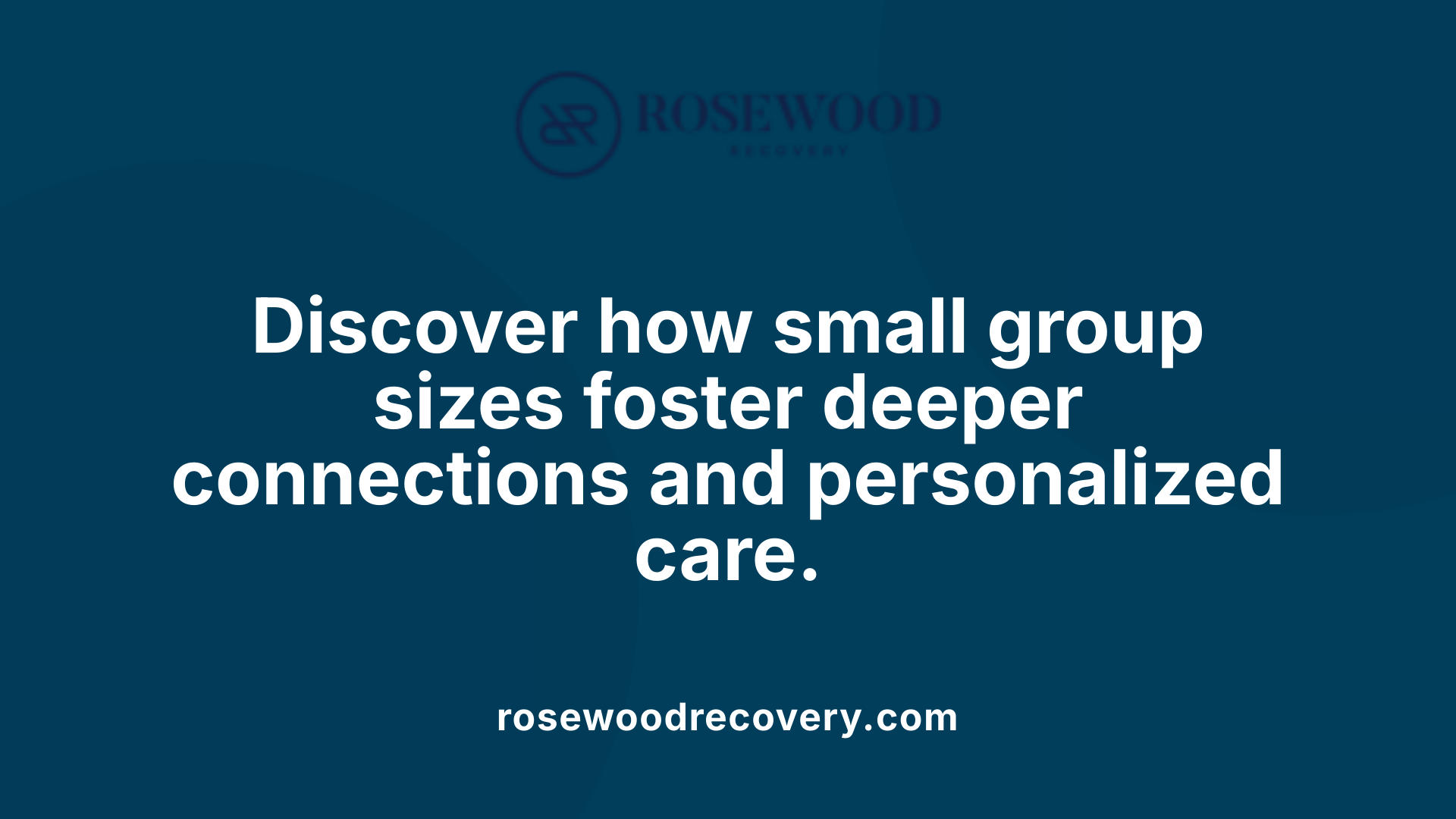
Typical Small Group Size Ranges
Small group therapy in addiction and mental health recovery typically involves 6 to 12 participants. Some centers, such as Insight Recovery Center and Lighthouse, cap groups at 16 and 8 participants respectively to ensure intimacy and personalized care. This size range supports more individualized attention than larger groups.
Personalized Attention and Deeper Connections
Smaller groups allow licensed therapists to tailor sessions to individual needs, fostering an environment where participants receive personalized guidance. This leads to deeper connections among group members as they share experiences and support each other.
Building Strong Bonds and Relationships
Compact group sizes help participants develop strong interpersonal relationships, which are vital for long-term sobriety. Small groups provide a setting for practicing social skills, enabling members to form ongoing peer support networks necessary for sustained recovery.
Reducing Isolation and Fostering Empathy
Group therapy diminishes feelings of isolation by connecting individuals facing similar challenges. The shared experiences create empathy and mutual encouragement that enhance motivation to recover and prevent relapse. Small groups further cultivate this supportive atmosphere.
Creating a Safe, Confidential Environment
Smaller groups foster an atmosphere of confidentiality and respect, which are core to formative therapeutic work. This safe space empowers participants to openly share struggles without judgment, facilitating emotional growth and mutual support essential for recovery.
Overall, by limiting group size, treatment programs enhance the quality of therapy, promote social connection, and improve treatment outcomes for individuals recovering from substance abuse and mental health disorders.
Different Models of Group Therapy and Their Unique Contributions
What Are Psychoeducational Groups?
Psychoeducational groups focus on educating clients about the science of addiction, its behavioral impacts, and consequences. These groups help individuals understand their substance use challenges, reframing harmful patterns and supporting early recovery stages through knowledge and insight.
How Do Skills Development and Cognitive-Behavioral Therapy (CBT) Groups Work?
Skills development groups teach practical abilities essential for maintaining sobriety such as refusal skills, anger management, and communication techniques. Cognitive-behavioral therapy (CBT) groups concentrate on changing maladaptive thought patterns and beliefs that can perpetuate addiction. By combining these approaches, clients learn to manage cravings, reduce negative emotions, and develop healthier coping strategies.
What Role Do Support and Relapse Prevention Groups Play?
Support groups provide emotional encouragement and help participants improve their interpersonal skills, fostering a sense of belonging and reducing isolation. Relapse prevention groups specifically address triggers and high-risk situations, helping members build resilience and strategies to maintain long-term abstinence.
How Are Trauma-Informed and Family-Inclusive Groups Different?
Trauma-informed groups acknowledge past traumatic experiences as critical factors influencing addiction, offering a safe space to process these issues with sensitivity. Family-inclusive therapy involves relatives in treatment, aiming to rebuild communication, restore trust, and strengthen family dynamics, which are vital for sustained recovery success.
What Are Specialized Groups for Diverse Populations?
Specialized groups cater to unique needs based on gender, ethnicity, or co-occurring disorders. For example, women’s recovery groups address gender-specific challenges, while other groups may focus on cultural considerations or mixed substance use disorders, ensuring more tailored and effective treatment outcomes.
| Group Type | Focus Areas | Unique Contribution |
|---|---|---|
| Psychoeducational | Addiction knowledge, behavioral education | Increases awareness and supports early recovery |
| Skills Development & CBT | Coping skills, cognitive restructuring | Teaches practical tools and changes thought patterns |
| Support & Relapse Prevention | Emotional support, managing triggers | Builds social skills and prevents relapse |
| Trauma-Informed | Processing trauma, safety | Addresses trauma’s role in addiction |
| Family-Inclusive | Family dynamics, communication | Strengthens support systems |
| Specialized Groups | Gender, ethnicity, co-occurring issues | Provides tailored recovery experiences |
Small Groups as a Complement to Individual Therapy
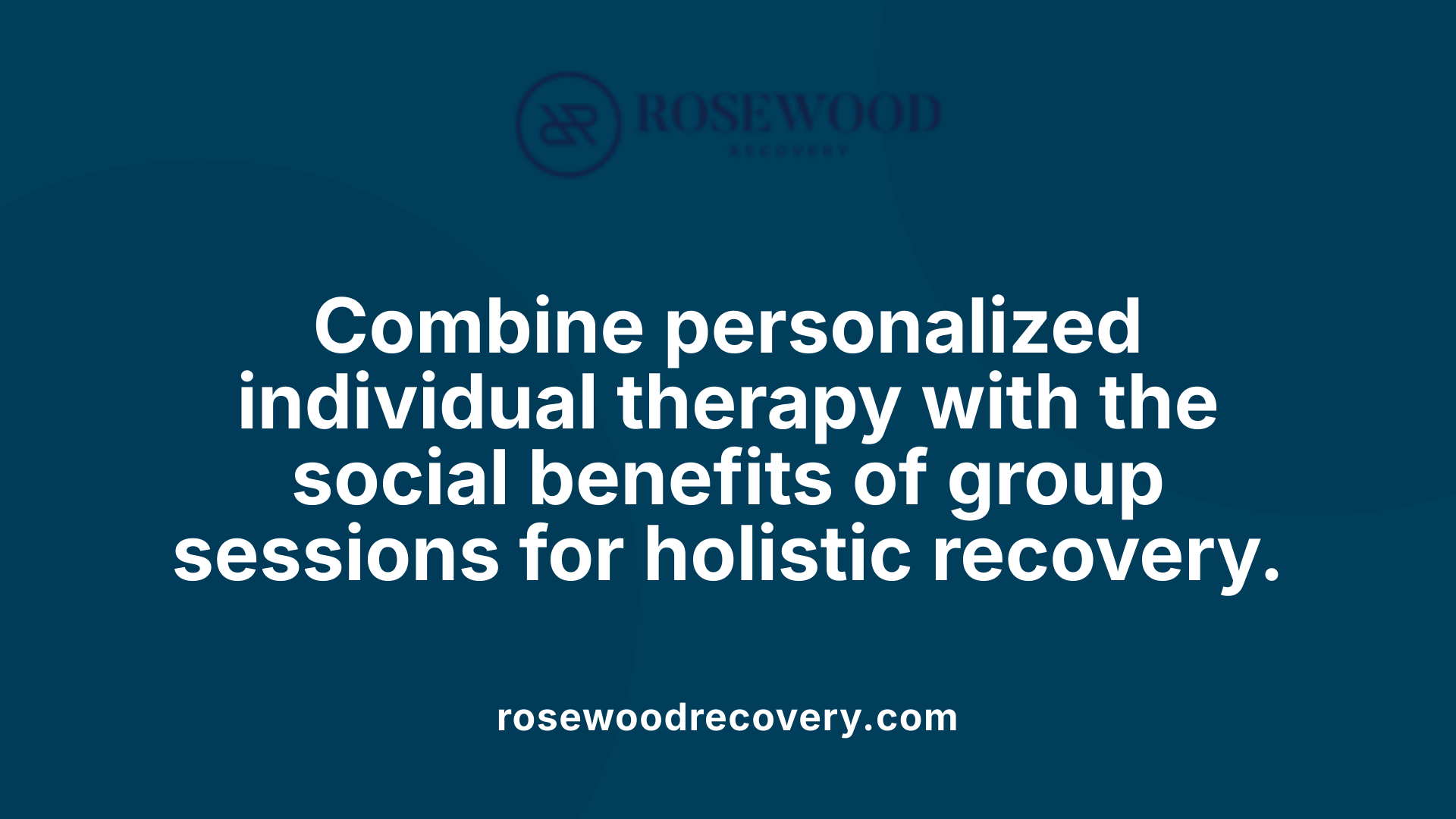
How are group therapy and individual therapy integrated in addiction treatment?
In addiction recovery, small group therapy sessions are often used to complement individual therapy, creating a holistic approach to treatment. While individual therapy focuses on personal issues and tailored interventions, group therapy provides a shared space for real-time practice of skills and social interaction. This integration helps patients apply coping strategies learned individually within a supportive community setting.
How do small group settings foster real-time practice and social skill development?
Small groups, typically with 6 to 10 participants, create an intimate environment where individuals can safely experiment with new behaviors and communication styles. This hands-on practice is invaluable for developing social skills necessary for sustaining long-term recovery. Participants receive timely peer feedback, which promotes self-awareness and adjustment of maladaptive behaviors.
What role does peer feedback and accountability play in recovery?
Within small groups, peers offer insight, encouragement, and constructive feedback, fostering a sense of accountability. This dynamic helps reduce feelings of isolation and motivates members to stay committed to abstinence. The shared experience and mutual support also reinforce the belief that recovery is possible, enhancing members’ self-efficacy.
How do small groups contribute to holistic recovery approaches?
By blending group therapy’s social learning with individual therapy’s personalized work, treatment programs address both intrapersonal and interpersonal dimensions of addiction. This holistic approach supports not only abstinence but also emotional regulation, relationship rebuilding, and relapse prevention.
Which therapeutic factors are enhanced by small group therapy?
Small group therapy nurtures essential therapeutic elements such as universality (feeling understood), altruism, hope, imparting information, cohesiveness, catharsis, interpersonal learning, and self-understanding. These factors collectively promote personal growth and sustained motivation, making group sessions a vital component of comprehensive addiction treatment.
Clinical Leadership and Structure in Small Group Recovery Sessions
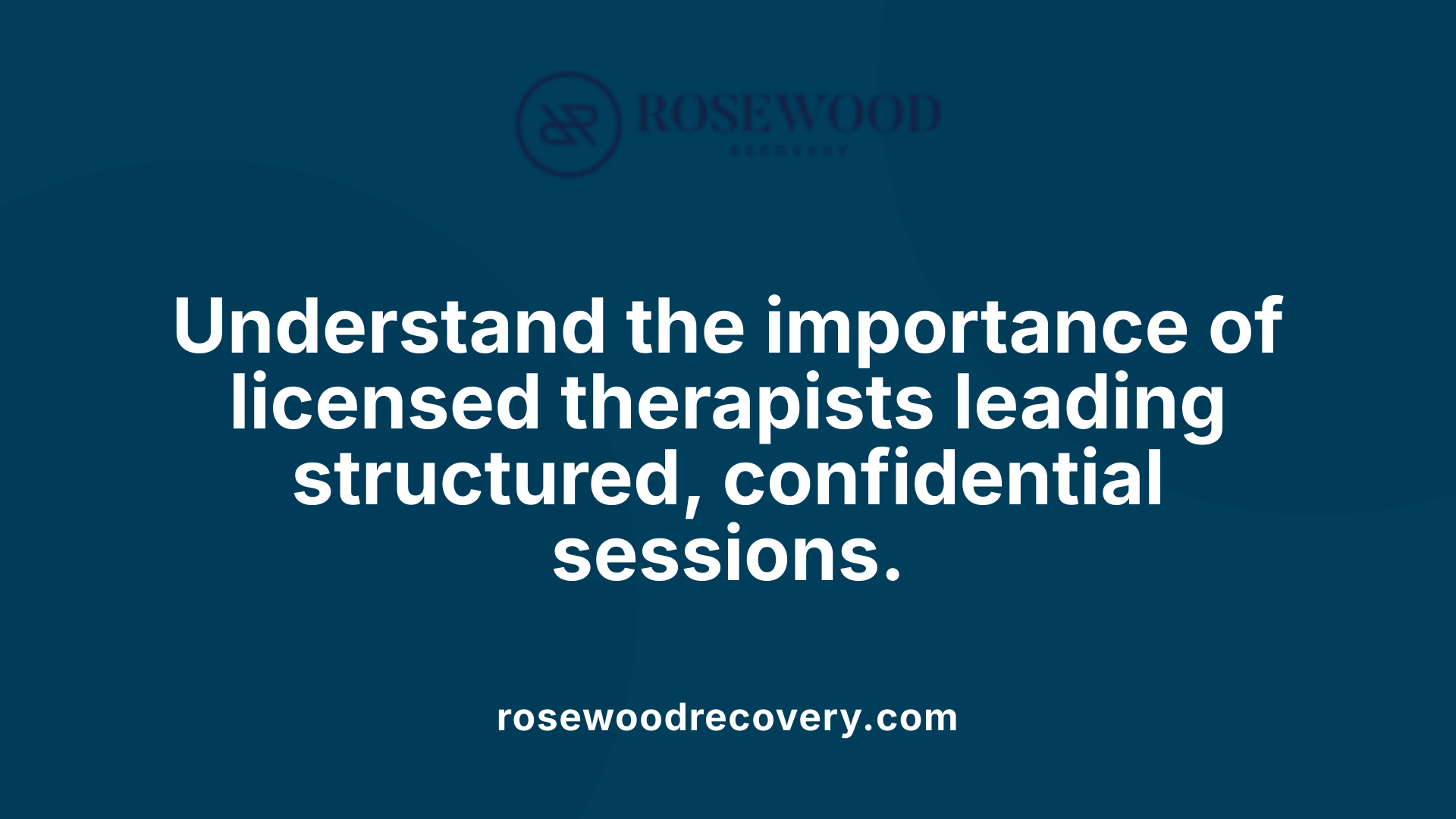
Licensed Therapist-Led Session Benefits
Small group therapy sessions for addiction recovery are typically led by licensed therapists or counselors specializing in addiction treatment. Their expertise ensures that sessions are structured effectively and provide professional guidance on recovery strategies. Licensed leadership fosters a safe space where participants can share openly and receive credible feedback, which enhances therapeutic outcomes.
Structured, Supportive Environments
These sessions commonly feature groups of 6 to 12 participants, creating an intimate setting conducive to deep connections and personalized attention. The structured nature of group therapy promotes accountability, mutual support, and consistent engagement, all vital for reducing relapse risk and strengthening recovery journeys.
Confidentiality and Respect as Foundational
Establishing confidentiality and mutual respect is crucial to cultivating a safe, nonjudgmental environment. These foundational rules encourage honest sharing without fear of stigma or breach of privacy, thereby supporting emotional growth and a sense of community among participants.
Management of Group Dynamics and Conflicts
Skilled therapists actively manage group dynamics to handle conflicts or disruptive behaviors constructively. Effective conflict resolution maintains group cohesion and a therapeutic atmosphere where every member feels heard and valued, which is essential for maintaining motivation and trust.
Importance of Clear Agreements and Skilled Leadership
Clear group agreements regarding participation, confidentiality, and respectful communication set expectations from the outset. Combined with expert leadership, these agreements help guide the group through phased development stages, optimizing therapeutic benefits and enhancing personal and group growth within recovery programs.
Small Group Therapy’s Role in Supporting Long-Term Sobriety
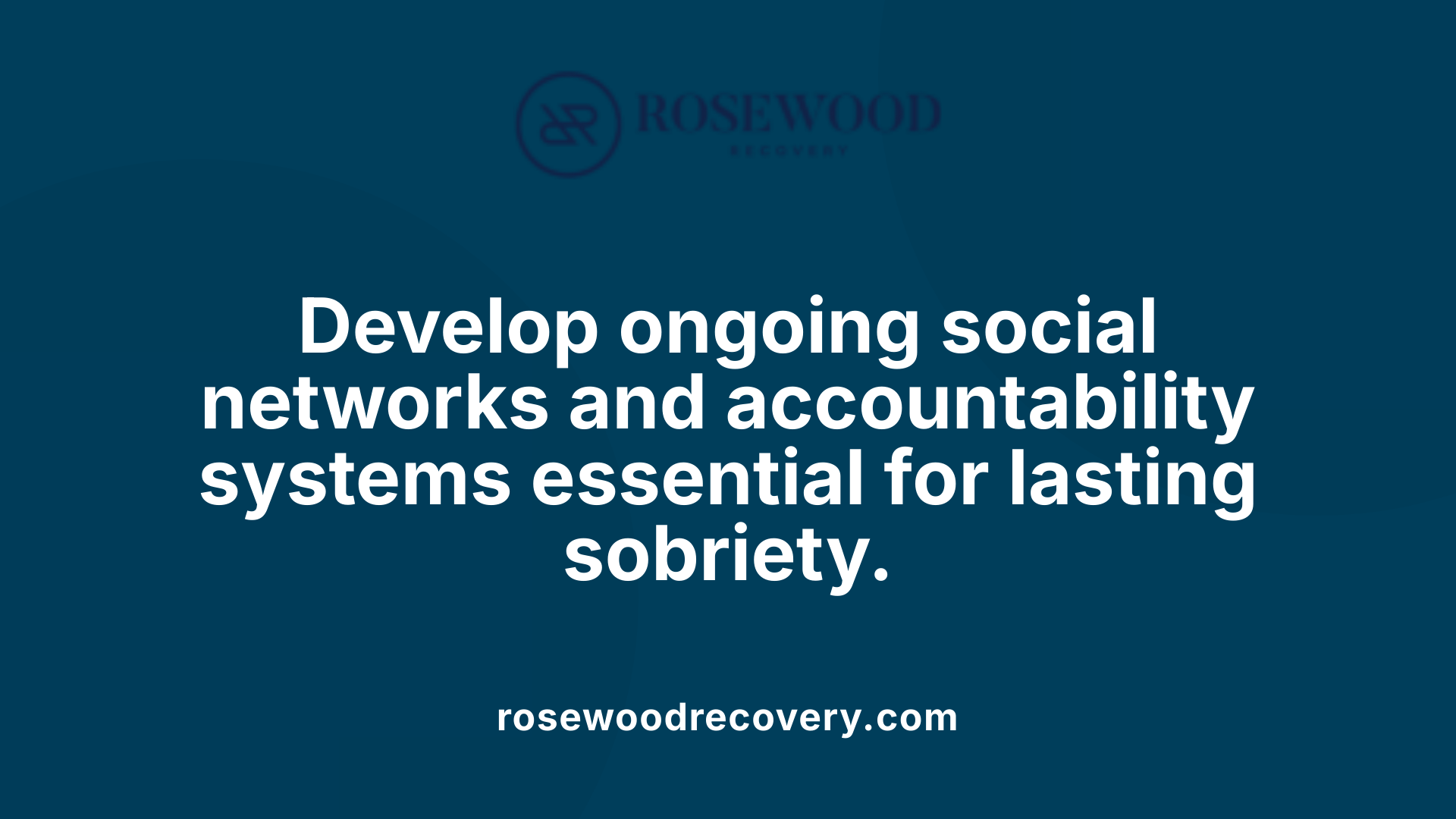
How Does Small Group Therapy Build Social Networks and Community?
Small group therapy, usually consisting of 6 to 12 members, provides an intimate setting where individuals recovering from substance use disorders can form meaningful relationships. These smaller groups facilitate stronger bonds, helping participants feel less isolated and more connected. Through shared experiences, members develop a supportive social network crucial for sustaining sobriety long-term.
In What Ways Does Peer Accountability and Positive Peer Pressure Enhance Recovery?
Group therapy environments foster peer accountability by encouraging participants to commit to recovery goals in a supportive, nonjudgmental space. Positive peer pressure arises naturally as members observe and emulate healthy behaviors. This mutual support system reinforces abstinence and motivates individuals to maintain recovery efforts consistently.
How Does Group Therapy Help Reduce Feelings of Shame and Stigma?
Sharing personal struggles within a safe, confidential group setting reduces feelings of shame and stigma commonly associated with addiction. Hearing others' stories normalizes challenges and promotes empathy, which helps participants reframe their experiences positively, improving self-acceptance and emotional resilience.
What Role Does Emotional Growth and Development Play in Small Group Therapy?
Small groups provide opportunities for members to express emotions, receive feedback, and engage in interpersonal learning. This fosters emotional growth through catharsis, increased self-understanding, and improved social skills. Developing these capabilities supports healthier relationships and mental well-being essential for long-term recovery.
How Is Motivation and Reinforcement for Abstinence Improved in Group Settings?
Group sessions offer ongoing encouragement and reinforcement from peers and therapists alike. Celebrating milestones together and witnessing progress inspires motivation. Therapeutic factors such as hope, altruism, and cohesiveness create a powerful climate that sustains commitment to maintaining sobriety over time.
Overall, small group therapy complements individual treatment by fostering a recovery community that strengthens social connections, accountability, and personal growth—all vital ingredients for long-term sobriety.
Evidence-Based Outcomes Supporting Small Group Recovery Approaches
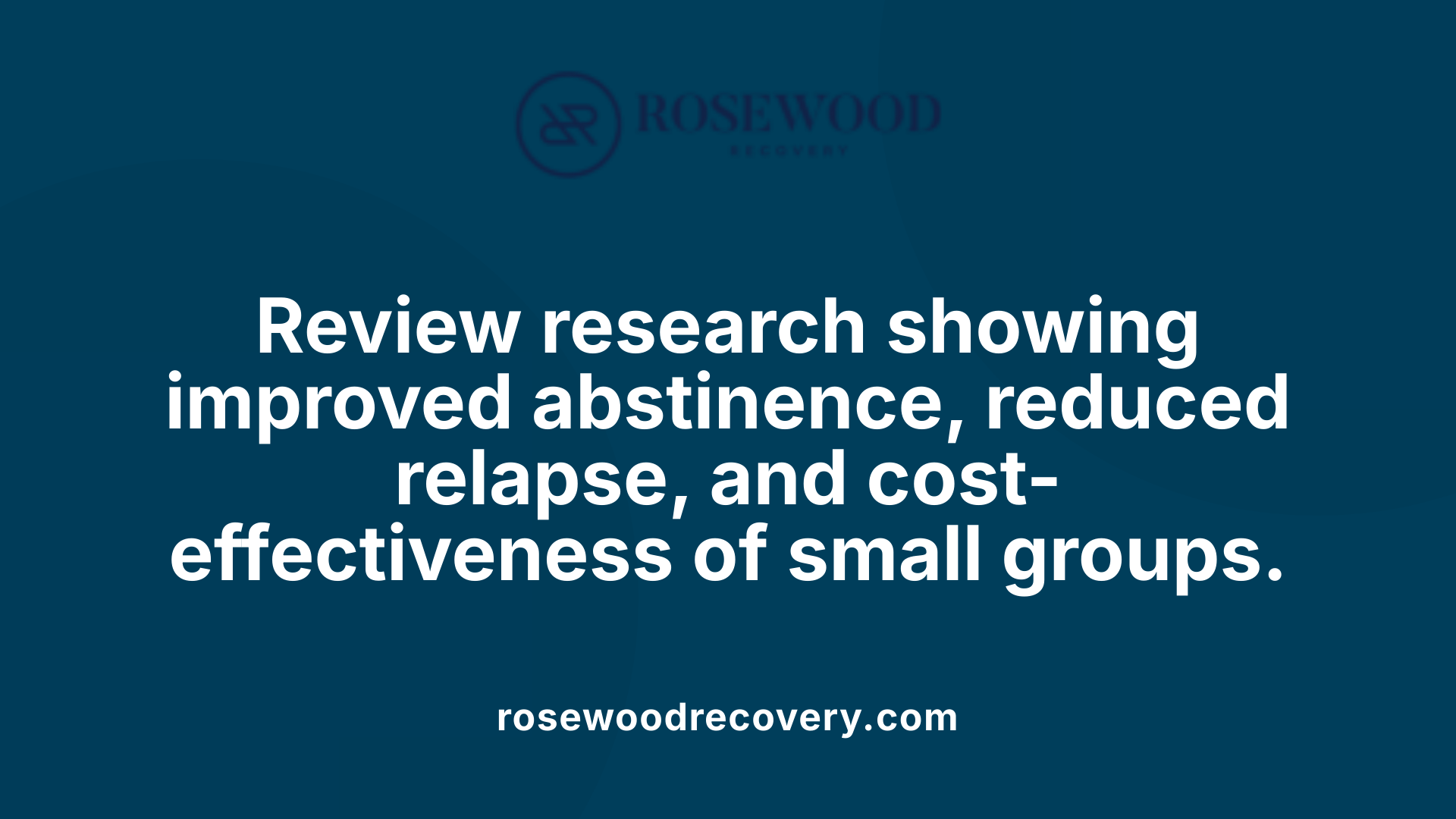
What does research say about abstinence and relapse rates?
Peer support groups and small group therapies consistently show positive outcomes in substance use disorder (SUD) recovery. Studies report higher abstinence rates, significant reductions in relapse, and less homelessness among participants in such groups. These benefits are attributed to enhanced social support, shared coping strategies, and peer accountability, which bolster long-term recovery.
How does group therapy compare with individual therapy?
Evidence suggests that group therapy can be as effective as individual counseling for SUD treatment. The social learning and peer support inherent in groups provide unique advantages, including reducing isolation and fostering a culture of recovery. In some cases, group therapy has been shown to be more beneficial, especially when combined with individual therapy to offer a holistic approach.
What impact does group therapy have on co-morbid mental health symptoms?
Group interventions not only address substance abuse but also reduce anxiety, depression, and overall distress, improving clients' mental health. By creating safe, nonjudgmental environments, group therapy supports emotional growth, self-understanding, and interpersonal learning, which are essential for managing co-occurring psychiatric symptoms.
What does meta-analysis reveal about optimal group sizes?
Meta-analyses highlight small groups of approximately 6 to 12 participants as most effective. These sizes encourage intimacy and allow skilled therapists to tailor interventions and manage group dynamics efficiently. Typical sessions last around 90 minutes weekly, promoting sustained engagement without increasing dropout rates.
Are small group therapies cost-effective and do they improve treatment engagement?
Small group formats offer cost-effective treatment by reaching multiple clients simultaneously while maintaining personalized care. This setting fosters stronger peer bonds, accountability, and social connections, which contribute to higher treatment retention and ongoing participation in recovery programs.
| Aspect | Evidence Summary | Implication for Treatment |
|---|---|---|
| Abstinence and Relapse | Higher abstinence, lower relapse with peer support and groups | Incorporate peer-led groups to sustain recovery |
| Group vs Individual Therapy | Comparable or superior outcomes with group therapy | Use group therapy alongside individual sessions for comprehensive care |
| Mental Health Symptoms | Reductions in anxiety, depression during treatment | Address co-morbidities simultaneously to improve outcomes |
| Group Size | Optimal group sizes of 6-12 recommended | Maintain small groups to enhance engagement and personalization |
| Cost and Engagement | Cost-effective, improves retention and peer support | Favor small groups for efficient, supportive, long-term recovery |
Tailoring Group Therapy to Individual Recovery Stages and Needs
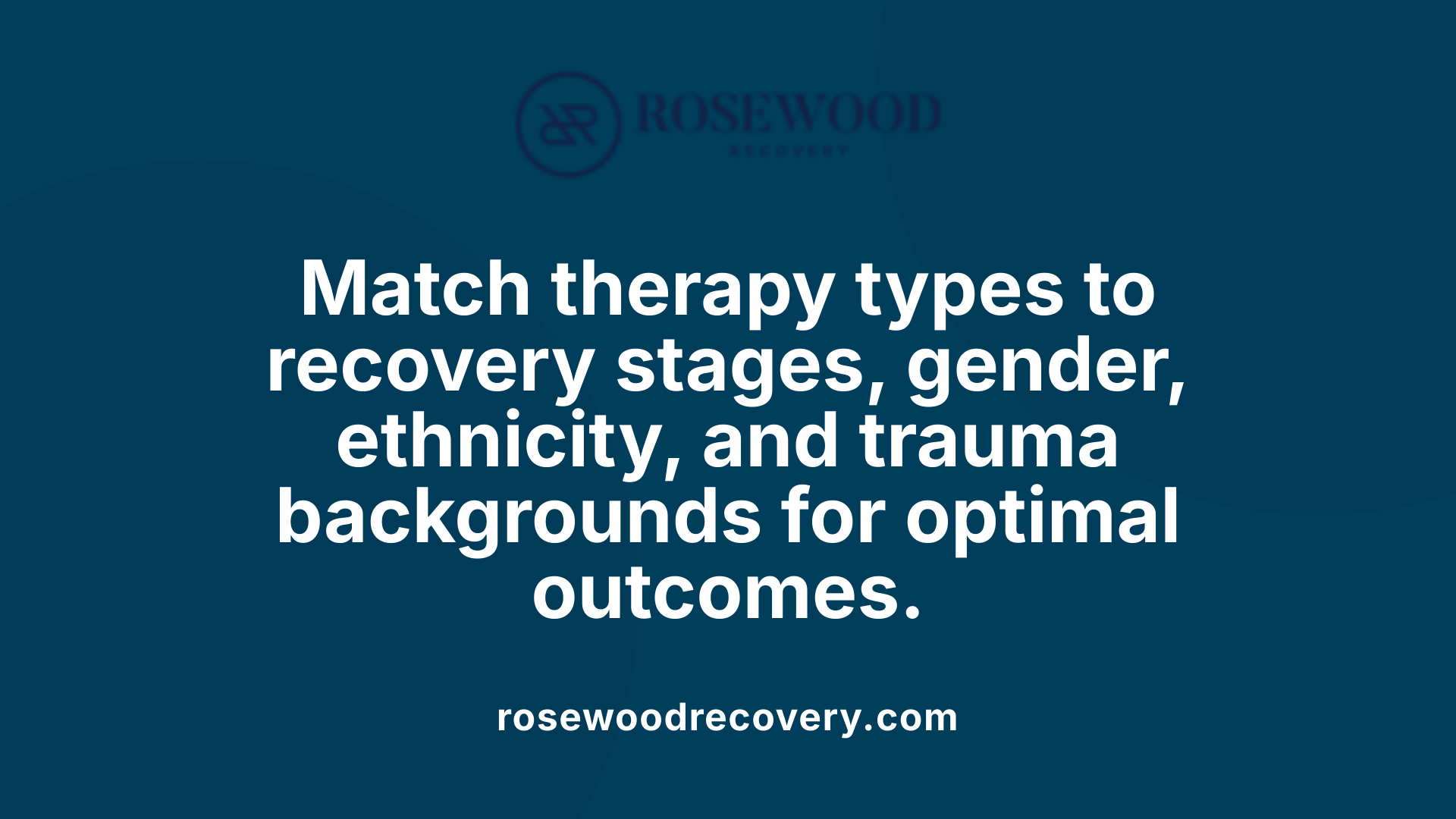
How Are Recovery Stage and Motivation Assessed for Group Therapy?
Assessing an individual’s stage of recovery and motivation is fundamental to effective group therapy placement. Clinicians evaluate readiness to change, current substance use patterns, and psychosocial factors. This assessment helps ensure that participants engage in groups aligned with their recovery phase, optimizing benefit and reducing relapse risks.
Why Match Therapy Type to Interpersonal Functioning?
Matching group therapy models to a participant’s interpersonal skills and functioning enhances therapeutic outcomes. For example, clients with strong social skills may thrive in interpersonal process groups, while those needing foundational skills benefit more from psychoeducational or skills development groups. Tailored placement supports gradual growth and fosters engagement.
What Are Special Considerations for Gender and Ethnicity?
Gender and ethnicity influence treatment experiences and outcomes. Women often report higher role functioning and may respond differently to group formats, calling for tailored approaches like women's recovery groups. Similarly, cultural sensitivity ensures minority clients feel respected and supported, addressing unique stressors and barriers.
Why Are Trauma-Informed Approaches Important?
Many individuals in addiction recovery have trauma histories. Trauma-informed group therapy creates a safe, respectful environment that avoids re-traumatization. It emphasizes empowerment, choice, and trust, helping participants engage more fully and heal while addressing both substance use and trauma symptoms.
How Are Groups Customized for Specific Populations?
Groups are often designed to address the specific needs of populations such as women, LGBTQ+ individuals, or those with co-occurring mental health disorders. These specialized groups provide targeted psychoeducation, coping skills, and support tailored to shared experiences, promoting connection and recovery success.
The Role of Family Involvement within Small Group Recovery Programs

What are the benefits of family-inclusive therapy in recovery programs?
Family-inclusive therapy plays a crucial role in small group recovery programs by fostering improved communication, rebuilding trust, and enhancing family dynamics. Including family members in therapy sessions provides patients with a broader support system that can contribute significantly to sustaining long-term recovery. It helps participants feel understood and supported beyond the therapy group, addressing relational factors that often feed into addiction and mental health disorders.
How does family involvement improve communication and rebuild trust?
Small group recovery settings encourage open dialogue where family members and clients can express emotions and perspectives constructively. This dynamic reduces misunderstandings and promotes healing. Rebuilding trust is facilitated through shared experiences and therapist-guided interventions that address past conflicts, enabling family members to support each other through the recovery journey.
In what ways does family involvement strengthen family dynamics during recovery?
By engaging the family unit, therapy addresses dysfunctional patterns and equips members with tools to support each other. This strengthening of family dynamics creates a more stable and nurturing environment essential for maintaining sobriety, preventing relapse, and improving emotional stability. Family-inclusive therapy also works to repair relationships damaged by substance use, cultivating resilience within the family.
What impact does family involvement have on recovery success rates?
Research indicates that incorporating family in small group recovery programs correlates with higher rates of treatment success. Family involvement has been linked to improved treatment engagement, reduced relapse rates, and better overall patient functioning. Patients often experience enhanced motivation and accountability when their support systems are actively involved in recovery efforts.
How is family-inclusive therapy integrated with group and individual therapies?
Small group formats provide a safe, structured setting where family members participate alongside clients, often complementing individual therapy. This integration ensures that both personal issues and relational dynamics are addressed holistically. Therapists skilled in addiction recovery facilitate these sessions to align family interactions with individual treatment goals, thereby creating a comprehensive approach that boosts overall effectiveness.
Small Group Environments Foster Recovery Capital and Hope
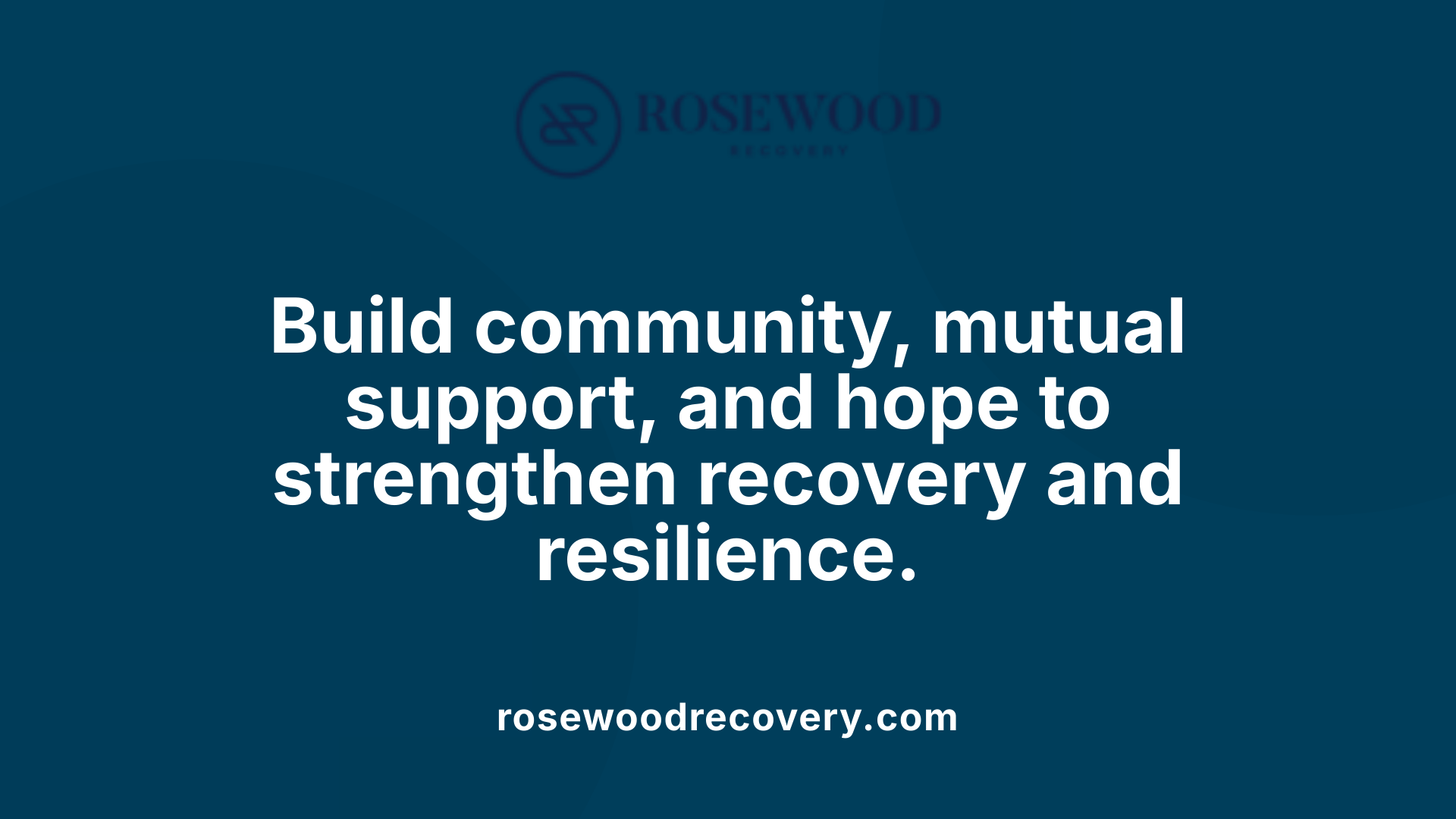
How does the creation of group spirit and shared hope contribute to recovery?
Small group therapy environments foster a unique group spirit where members develop a collective sense of hope and motivation for recovery. This shared hope arises from witnessing peers progress, which builds optimism and strengthens commitment to sobriety. Connecting within a group of 6 to 12 participants allows for intimate interactions that nurture trust and belonging, elements essential for building recovery capital.
What universal therapeutic factors are present in small groups?
Small groups support universal therapeutic factors such as altruism, where members give and receive support; catharsis, the emotional release achieved through sharing; and imparting information, whereby members exchange valuable recovery knowledge. These factors collectively promote healing by creating empathy, reducing isolation, and providing corrective experiences related to past family or relational patterns.
How do small groups facilitate self-understanding and interpersonal learning?
Through reflective dialogue and feedback within these groups, individuals enhance self-awareness, recognizing how their behaviors and emotions influence relationships. Interpersonal learning is achieved as members observe and adopt successful coping strategies from others, fostering social skills vital for sustained recovery. This mirrors evidence from reviewed literature emphasizing improved social support perceptions and self-efficacy arising from group participation.
In what ways do small groups build support systems for ongoing recovery?
Small group settings act as enduring support systems, where similar life experiences create a foundation for mutual encouragement and accountability. The development of these networks extends beyond structured therapy sessions, helping reduce relapse rates and homelessness by maintaining ongoing connections. Programs like Insight Recovery Center emphasize limited group sizes (e.g., 16 residents) to prioritize personalized and sustained support.
What are some examples of programs maintaining limited group sizes?
Facilities such as Insight Recovery Center and Lighthouse employ small group formats capped at 8 to 16 participants. This approach ensures personalized therapy, enhances peer connections, and facilitates tailored treatment planning. These controlled environments reflect best practices for maximizing therapeutic benefits and long-term recovery outcomes.
| Aspect | Description | Example Program |
|---|---|---|
| Group Spirit and Shared Hope | Builds optimism and motivation through collective experience | Lighthouse, Insight Recovery Center |
| Universal Therapeutic Factors | Includes altruism, catharsis, imparting information, socialization techniques | Applied Psychology Studies |
| Self-Understanding | Reflection and interpersonal learning through peer feedback and shared experiences | Psychoeducational and CBT Groups |
| Support System Building | Creation of networks reducing relapse, enhancing accountability, and preventing social isolation | Insight Recovery Center |
| Limited Group Sizes | Groups limited to 6-16 participants to enhance intimacy and personalized care | Lighthouse, Insight Recovery Center |
Small Groups: The Foundation for Personalized, Effective Recovery
Small group sizes in addiction and mental health recovery programs provide the personalized attention, peer support, and safe environments essential for successful treatment. By facilitating deeper connections, fostering accountability, and enhancing therapeutic engagement, these intimate settings address individual needs while promoting community and hope. Integrating mental health with substance use treatment, tailoring approaches to diverse populations, and including family support further strengthen recovery outcomes. As evidence continues to affirm, embracing small group therapy is vital for achieving long-term sobriety and holistic wellness in recovery journeys.
References
- Benefits of peer support groups in the treatment of addiction
- Your Guide to the Small Group Therapy Approach in Rehab
- The Benefits of a Small Group During Addiction Treatment
- Group Therapy for Drug Addiction - Top Recovery Programs
- A review of research-supported group treatments for drug use ...
- Group Therapy vs Individual Therapy: Uses, Benefits & ...
- The Benefits of a Smaller Treatment Group
- The Advantages and Benefits of Group Therapy for Addiction
- Quick Guide for Clinicians Based on TIP 41, Substance ...
- Group treatment for substance use disorder in adults

.jpeg)
.jpeg)

